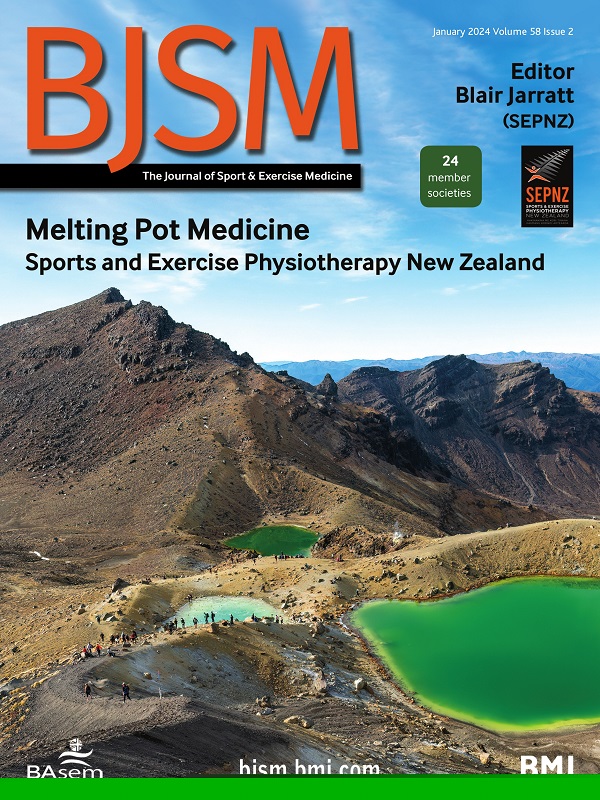Developing inclusive policy and guidelines in sport: a call to action for sport governing bodies and individuals to support neurodivergent athletes
IF 11.6
1区 医学
Q1 SPORT SCIENCES
引用次数: 0
Abstract
Neurodiversity refers to the natural variation in cognition (brain function and processing), social learning and behavioural traits; whereas, neurodivergence refers to neurological conditions and is an umbrella term that includes autism spectrum disorder, attention deficit hyperactivity disorder (ADHD), and learning and coordination disorders, such as dyslexia and dyspraxia.1 Individuals are more likely to have multiple related neurodivergent conditions (co-occurrences) than they are to only present with one condition (see graphical overview of literature on co-occurrences).2 Neurodivergent conditions are often undiagnosed3 and or misdiagnosed4 due to their co-occurrence with other conditions, a general lack of awareness (eg, in clinicians), socioeconomic status (eg, mother education level), health access constraints (eg, medical waiting lists) and adaptive behaviours (eg, masking) that neurodivergent individuals use to blend in and be more accepted in society .5 In many countries, equality laws mean disability is a protected characteristic, like sex and religion. Neurodivergent conditions fall under the disability umbrella, even though individuals may not consider themselves to have a disability. Therefore, employers, such as sport governing bodies and clubs, have a responsibility to make reasonable adjustments to ensure their employees (eg, athletes, coaches) have an inclusive and accessible workplace (eg, designated quiet rooms with dimmable lighting). To help sport governing bodies and clubs build inclusive environments for neurodivergent individuals, policies and guidelines can be created and implemented with equity in mind. Equity is about providing specific resources and or opportunities to different people to reach an equal outcome. Dependent on the …制定体育包容性政策和指导方针:呼吁体育管理机构和个人采取行动,支持神经发散性运动员
神经多样性是指认知(大脑功能和加工)、社会学习和行为特征的自然变异;然而,神经分化指的是神经系统疾病,是一个涵盖性术语,包括自闭症谱系障碍、注意缺陷多动障碍(ADHD)、学习和协调障碍,如阅读障碍和运动障碍个体更有可能有多种相关的神经分化状况(共现),而不是只出现一种状况(见共现文献的图形概述)由于神经分化性疾病与其他疾病同时发生、普遍缺乏认识(如临床医生)、社会经济地位(如母亲受教育程度)、获得保健的限制(如医疗等候名单)和适应行为(如掩饰),神经分化性疾病往往未得到诊断和/或误诊。在许多国家,平等法意味着残疾是一种受保护的特征,就像性和宗教一样。神经发散性疾病属于残疾范畴,即使个人可能不认为自己有残疾。因此,雇主,如体育管理机构和俱乐部,有责任做出合理的调整,以确保他们的员工(如运动员,教练)有一个包容和无障碍的工作场所(例如,指定安静的房间,灯光可调暗)。为了帮助体育管理机构和俱乐部为神经分化的个人建立包容的环境,可以在制定和实施政策和指导方针时考虑到公平。公平是指为不同的人提供特定的资源和/或机会,以达到平等的结果。依赖于…
本文章由计算机程序翻译,如有差异,请以英文原文为准。
求助全文
约1分钟内获得全文
求助全文
来源期刊
CiteScore
27.10
自引率
4.90%
发文量
217
审稿时长
3-8 weeks
期刊介绍:
The British Journal of Sports Medicine (BJSM) is a dynamic platform that presents groundbreaking research, thought-provoking reviews, and meaningful discussions on sport and exercise medicine. Our focus encompasses various clinically-relevant aspects such as physiotherapy, physical therapy, and rehabilitation. With an aim to foster innovation, education, and knowledge translation, we strive to bridge the gap between research and practical implementation in the field. Our multi-media approach, including web, print, video, and audio resources, along with our active presence on social media, connects a global community of healthcare professionals dedicated to treating active individuals.

 求助内容:
求助内容: 应助结果提醒方式:
应助结果提醒方式:


